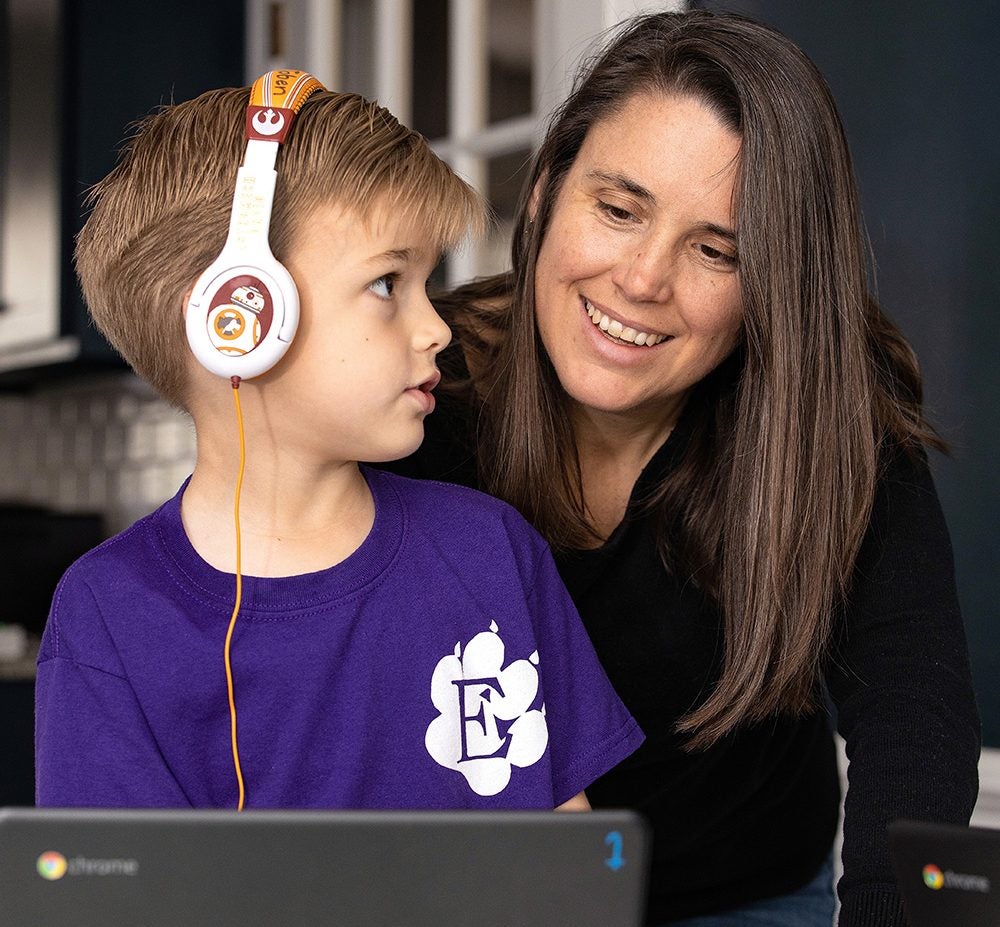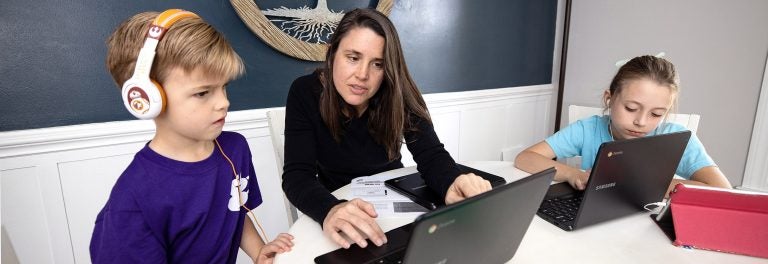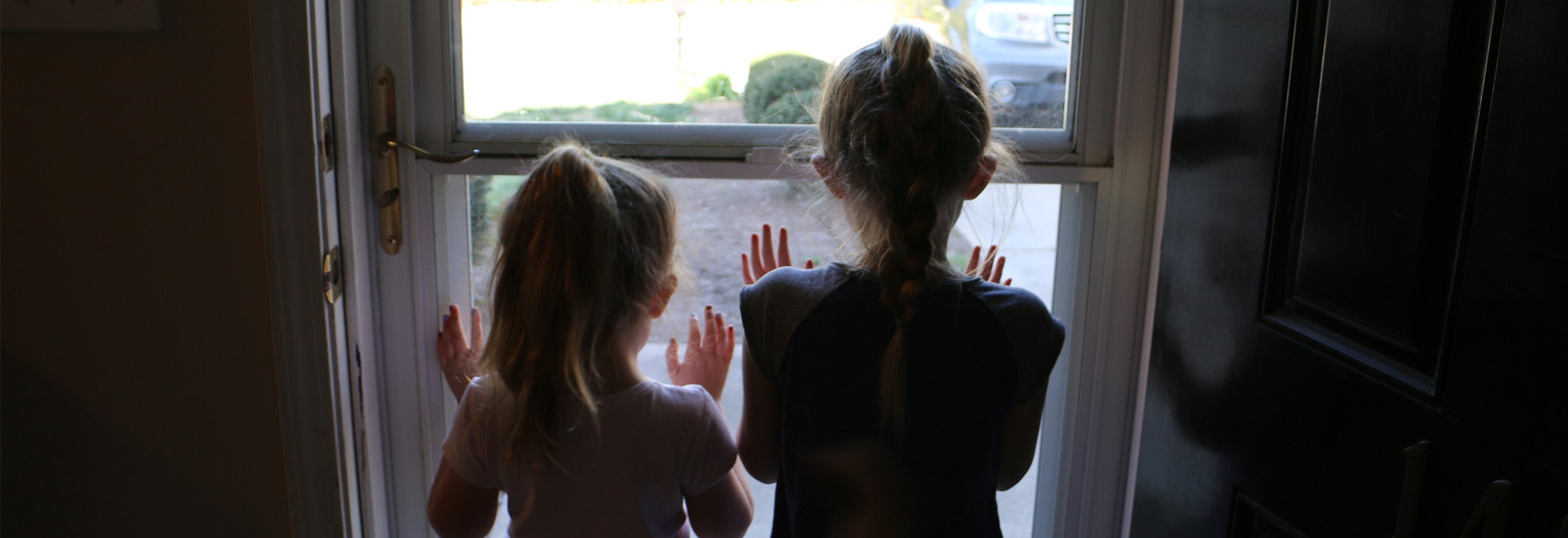COVID-19 & KIDS
ECU pediatricians offer tips on how to communicate to kids about COVID-19
As the days add up during the “stay at home” orders in North Carolina as part of safeguards against COVID-19, many children are becoming more restless and fearful. They may have more questions, while adults have exhausted the answers they have available—while their main goal is to keep kids healthy and happy.
Two East Carolina University pediatricians address some of kids’ and adults’ biggest questions surrounding coronavirus, from the seriousness of the virus’s contagion and symptoms to the best way to address children’s most common inquiries.
As the pandemic has evolved, more is being understood about the risk of coronavirus to children as patients and carriers.
“We are lucky that most kids (97% of those that tested positive for COVID-19) are either asymptomatic or don’t develop severe disease. However, the evidence indicates that kids readily contract/transmit COVID-19 in community settings,” said Dr. David Collier, professor of pediatrics and health disparities at ECU’s Brody School of Medicine. “Measures to prevent infection in children are important to not only protect your children but are critical to prevent the spread of COVID-19 to older loved ones or to loved ones with any of the common medical conditions that increase risk for severe illness and death.”

During the COVID-19 pandemic, children’s school routines have been transformed, among other changes to daily life they are experiencing. (Photo by Rhett Butler)
While the COVID-19 pandemic can feel overwhelming for anyone, Collier said it may be frightening at times for children and that communicating with them about the threat is not easy.
“A good place to start the discussion is to ask your child what they know about the pandemic or if there is anything specific worrying them. This may allow you to address specific concerns and/or correct misconceptions your child might have,” Collier said. “You should provide reassurance that researchers, doctors and leaders are working hard to learn more about the virus and are doing a lot of things to keep everyone safe. Give your child a sense of control by showing them and telling them the things they can do to keep themselves and their friends and family safe, such as social distancing and handwashing.”
And it’s OK to be honest with your child in acknowledging that no one knows when things will return to “normal,” Collier added.
“What you can tell your child is that the shelter in place restrictions will be lifted when it is safer to do so, but that there may still be precautions in place – such as continuing to have online school, no gatherings of more than 50 people, etc.,” Collier said. “It is OK to acknowledge that you don’t know exactly what is going to happen but reassure your child that you and your family will keep working on safe habits.”
FREQUENTLY ASKED QUESTIONS
Dr. Drew Baker, clinical professor of pediatrics and division chief of general pediatrics at Brody, recently answered the following questions from local parents about ways to keep their kids happy and healthy as coronavirus continues to impact their community and world.
How do I communicate with my children about the disease without scaring them?
Use direct and easy to understand language. Provide basic information without unnecessary details. Consider asking them what they have heard and what questions that they might have.
My little one thinks she has the virus every time she sneezes from seasonal allergies. How do I calm her fears?
Reassurance is key. Remind your little one that lots of things, aside from coronavirus, can make us cough and sneeze and feel bad. A doctor for children can be there to help families decide what medicines and tests might be needed to make kids feel better and stay healthy.
What are some of the best ways for adults to share information on how to stay healthy (hand-washing, not touching face, social distancing) in ways kids can understand?
Don’t just tell them…show them! Model good practices that will keep you safe and teach forgetting. Decide what song they might want to sing while they wash their hands properly.
What if my child develops symptoms? Are virtual visits an option if my child needs to see a doctor?
Health-care providers are being creative in offering care to children during this pandemic. Although many well-child and follow-up visits are being rescheduled, visits for children who are sick are being accomplished in a variety of ways—in-person office visits, telephone visits and, in some cases, video chat. Please contact your child’s physician to see how your child can most safely receive the care that they need.
ECU Physicians also has options for people with COVID-19 symptoms who do not have insurance or a regular physician with telehealth capabilities.
My kids want to play outside. Is it safe? Can they play with friends?
Play and exercise are so important for our kids and for us as adults. With the recommendation for social distancing by the experts, play with friends is not considered advisable or safe. This is a great opportunity for kids to spend more active time with parents and siblings. Consider new and creative ways to use your outdoor space—use what you have to create a fort or personal playground or sports playing field.
How can I keep my kids in shape and getting regular exercise while staying at home?
Kids love technology! Now is a great time to use active-exercise video games and apps. Set aside time every day for exercise for everyone in the home. Be creative. Try something that might be new to you like yoga or martial arts or dance videos on YouTube.
How do I keep my child stimulated besides watching TV?
We finally have time to do things we may not have tried in the past. Arts and crafts can be messy and fun! Clay and Play-Doh and painting and drawing allow us to use our creative side. Consider visiting a museum or art gallery-virtually—it’s free to visit the Metropolitan Museum of Art in New York and the Louvre in Paris online. Listen to music that might be new for you or your children. What about classical music or opera or a Broadway show?
What are some tips for handling the weekends after working with kids all week?
Consider keeping some kind of schedule—even if it is different from what is normal for your family. School work during the week. Fun time on the weekends. Don’t forget about virtual services available from many faith communities. Remember that other family members and friends might appreciate a phone call or video chat.

Related Story
ECU psychologist offers tips for coping with COVID-19-related cabin fever, stress
Read Now